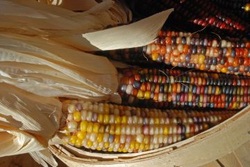
Everything starts with a seed. As it says in the movie, "without seeds, nothing else would exist." Whether you're a vegan, vegetarian, or omnivore like me, you and your food exist because of seeds. Everything you eat comes from a seed - even animals, which are fed on plants that come from seeds.
Yet you may be shocked to learn that 90% of the vegetable seed varieties in existence 100 years ago are now extinct! (I shared a helpful visual of this a couple of years ago on our sustainable gardening blog.)
The loss of seed diversity may seem like a shame, but how does it really affect you? In truth, it's actually a grave danger to our survival as a species (see #1 below).
The good news is, there IS something you can do about it: Plant heirloom or open-pollinated seeds!
Here Are 3 Reasons Why You Should Grow Heirloom Seeds This Year:
We're starting off with one of the scariest reasons why it is so important to preserve multiple varieties of plant species. And while it may sound a bit far-fetched at first, the truth is, the fewer varieties of seeds that remain, the more dependent we become on their survival for our survival. A widespread disease affecting a certain plant variety could very well wipe out a major food source. Even bad weather such as drought or flooding could cause a crop to fail - and without other varieties of that crop to fall back on, we might be proverbially "up a creek." If a major extinction ever affects one of our major food crops (which is actually quite likely), it may very well create a crisis of epic proportions that threatens our very survival.
Many say that keeping genetic diversity in our food supply is more important than taking steps to curb climate change - yet it is discussed far less frequently. You can help make a difference by sharing this article with friends, encouraging them to watch the documentary, and of course, growing and saving your own seeds.
2. Preserving Seed Diversity Is Up to YOU!
With the Monsanto's of the world breathing down the necks of large-scale farmers and limiting their options as to what seeds they can plant, it is increasingly left in the hands of the small gardener and independent organic farmer to save and preserve heirloom varieties of seeds for future generations.
Unlike inorganic items like silver and gold, however, you can't just lock seeds away in a vault forever. To preserve seeds for future generations, we have to grow them - and keep growing them!
Doesn't it feel good to know that you actually have control over this aspect of your food supply? YOU can make a real difference to our future - just by planting, growing, and saving some seeds every year. Not only that, but it's really fun and rewarding! Which brings us to...
3. Our Seeds Tell Our Stories
Many people nowadays may not remember the time when seeds were basically a part of the family, but they were. In fact, seeds were once traded as an extremely valuable commodity, and they were one of the most valuable possessions a family could own. There were even fables about them (Jack & The Beanstalk being probably the most famous). Seeds give the ability to create life, to make a living, to feed a family.
The church I attend is heavily involved with a small town in Nicaragua (I had the great opportunity to travel there on a missions trip a few years ago - one of the most eye-opening experiences of my life), and one of their current missions is providing small farm loans to families so they can...buy seeds! With these seeds, many farmers have been able to not only feed their families, but create economic opportunities for themselves and others in their small village. The value of seeds is very evident in places like this.
| But even in areas of plenty, like the U.S., seeds are linked to us in ways that many of us have forgotten. And growing them provides us with a sense of connection and purpose that goes much deeper than just putting food on the table (although of course that is also important). As Open Sesame's filmmaker explained in an interview with Modern Farmer Magazine, "When you save or share seeds, they become woven into our lives and our cultural memories. The tomatoes you grow remind you of the first time you made homemade pasta sauce. When you trade seeds, you trade stories. And that gives them another kind of life that is just as nourishing as growing them for food." So what can you do to help preserve genetic diversity in our food supply? |
To find open-pollinated seeds, ask around at farmer's markets and see what unique varieties they know of and/or grow, and where they get their seeds.
You can also join the Seed Savers Exchange, and/or start your own "seed library," and swap seeds - and their stories - with friends!
Now spring is in the air - let's get planting! :-)
Rose.
P.S. Even if you're not a gardener, I hope you take the time to watch the documentary, and learn about the importance of genetic diversity in the food we eat. Maybe it will inspire you to start a little garden plot of your own. Or at the very least, share this important information with friends who garden! Just click the social media buttons below to share this post.




 RSS Feed
RSS Feed